A weekly newsletter on what I’ve written, read, and otherwise enjoyed.
I am two weeks behind on The Invisible College, my series of literature courses for paid subscribers—two very strange weeks, if I may excuse myself. Je suis désolée, but I will release a Proust episode very shortly, within days, and the Rilke episode should be on time, maybe a day or two late at most. When the Proust episode drops, you will be able to say, and to mean in every sense, “It’s about time.”
My novel, Major Arcana, continues its perilous Bildung. You can order the print or ebook here and the print book wherever books are sold online; the professional audiobook, also available for preorder at the earlier link, will be out in 10 days. If you love it, or if you hate it in an intriguing way, a review on Goodreads or Amazon would really help. I have stopped reading all of what’s written about it, but, right here on Substack, Rich Horton contributes a very insightful essay that, because it doesn’t go out of its way to avoid spoilers, gives a very accurate sense of what the book is all about, concluding, “much of the book’s extended denouement had me in tears.” Adam Flaming Petty also insightfully reviews Major Arcana together with Ross Barkan’s Glass Century as a doubled instance of the narrator’s brash return to the American novel:
Glass Century proceeds in stately linear fashion, beginning in the early 70s, onward to a coda set in the pandemic. Major Arcana, however, hops about in time as well as among different characters. It is almost never confusing, though, as the narration is extremely bossy, detailed, and declamatory. Those are compliments, by the way.
[…]
Ah, let me drop the pretense. I loved Major Arcana, even when I found it annoying. Especially then? For that is what novelistic narration does at its best. Embody strange, offputting ideas in characters one can’t help but love. What’s more human than that?
In passing, Petty also provides a mixed review of this very newsletter:
Pistelli, as the narrator of this sprawling novel, possesses a braggy insouciance that combines the insight of a 19th century British novel with the baseless self-assurance of a Tumblr account circa 2014. Pistelli writes voluminously on his own newsletter, Grand Hotel Abyss, and though I read it every week, I can’t help but suspect that he has such a command of rhetoric that he ends up taking bizarre, contrarian positions just for the sake of spinning baroque yards of prose. Yet that serves him well in the writing of a novel, especially this kind of novel, which continuously drops anchor in the depths of different, even opposed, characters.
Yes, Socrates, as ever, was right; we are all Sophists here, all Sophists now. Speaking of Substack, I went to greet it in literary America’s literary capital. I don’t like to write about my private life or any other person’s, on here or anywhere else. I go in fear of self-absorption. I am especially wary of the phenomenon where the first album is about one’s hardscrabble upbringing, while the second and third and fourth albums exclusively concern the hardships of fame. (Even later ones will apparently dwell on Hitler, however.) But I was asked, by more than one person, for a travelogue, so here one is, an autofiction, the revenge of the fragmentary first person upon me.1 It’s really obnoxious; you probably shouldn’t read it; I certainly wouldn’t. Please enjoy!
This Point in Living: My Metropolitan Review
§1. Wednesday. A song lyric plays in my mind as I head northeast on the Amtrak:
Someone’s got it in for me They’re planting stories in the press...
Third parties, including a fact-checker, are contacting me about a piece that will run in The New Yorker about fiction and Substack; I and Major Arcana will be mentioned, perhaps prominently; I know nothing about it. It’s coming Sunday? It’s going to be bad, worse than Stivers? It’s going to be good, if grudgingly, the new media hailing the old? I don’t know; it’s out of my hands. “Be careful what you wish for”—that’s the moral of my novel. What kind of sorcerer’s apprentice would I be if I got just what I wanted, exactly how I wanted it? On the train, I know I should read Proust. I read Noah Kumin’s forthcoming Stop All the Clocks instead. (The title is from Auden, but Proust also wanted to stop the clock. Who doesn’t?) Review next week; I still need to finish. Provisional judgment, pending the conclusion: it’s less like Neuromancer—someone said it was like Neuromancer—and more like The Man Who Was Thursday, not a techno-thriller but a philosophical detective story. I take a taxi to Williamsburg, check into my hotel. It’s literally called The Pod on account of the rooms’ petiteness. The Pod doesn’t serve “the bugs,” except, I presume, for the universal nightly quota we are all said to ingest. It’s very sleek—silver and glass, like living inside my MacBook Air, more than I already do—of luxuriousness all compact, priced at a bargain considering the locale. This isn’t sponcon, but I recommend it all the same.2
§2. Thursday morning. I walk up and down Williamsburg, experiencing (perhaps forcing) beautiful moments, epiphanies, spots of time. I read Proust by the East River on a fresh spring morning, the great cityscape just beyond my book, the clouds massing above; I finish “Swann in Love” with its marvelously ironic conclusion:
“To think that I have wasted years of my life, that I have longed for death, that the greatest love that I have ever known has been for a woman who did not please me, who was not in my style!”
I read Kumin in a work-space café/bank I accidentally wander into and am cajoled into patronizing by the greeter; the novel’s satire on work-spaces is augmented by the setting, sharpened by the cold brew. But still, I think, despite the loveliness of the neighborhood and its people, that it’s true what they say. It looks a lot like “Brooklyn” from TV and movies, duly copied in all smaller cities. Every place is becoming every other. Williamsburg is a bigger version of my local haunts in Pittsburgh, of the places I traveled from, which are likewise akin—except that the East (Pittsburgh and Brooklyn) is more historically colorful than the Midwest—to my local haunts when I lived in Minneapolis. Part of it is my own fault, my own lack of imagination, but I’ve come and gone a long way just to shop at Whole Foods the entire time. The hip youth aren’t even dressed much differently in Brooklyn from the way they dress anywhere else. (If I discern any novelties in metropolitan fashion, they appear to involve a sort of hippie revival—a lot of flowing pants—plus the already remarked-upon “Ralph Lauren nationalism.”) I know we’re going to get offline and touch the proverbial grass any day now, but, for the moment, we still can’t find the vanguard in this or that place on the map, but only in these trackless pixellations, the ones where we are, right here: “Look where your hands are. Now.” When I get back to The Pod, these thoughts in my head, I see that an American has been elected Pope, apparently as an intervention in American political debate. I hope you won’t take it either as a political or a religious statement if I say I find something humanly disturbing in this. We are all out of elsewheres. Maybe I should learn to see the promise in it, in the Whole Foods archipelago that runs through the very Vatican. It’s one world now; there is no other.
§3. Thursday night. And sometimes you get just what you wanted, exactly how you wanted it. Ross Barkan and Adam Pearson come to The Pod to get me and we walk through the rain from Williamsburg to Greenpoint. We talk about what writers are accurately said to talk about in private: not literature, but sales, marketing, reviews. “What’s this thing in The New Yorker about?” Ross asks almost immediately. I have no idea and no idea how he knows; but then he is a reporter, whereas I just make everything up. “Gasda’s book is in McNally Jackson, but not mine or yours,” I ruefully report.3 The gentrification gives way to a less aestheticized post-industrial blightscape as we near The Brooklyn Center for Theatre Research. We live in the ruin of structures I’m not sure we could rebuild, happy in our etherial fantasy world; it occurs to me that this can’t be the first time in our history we’ve invented the internet, though perhaps the last time it was just telepathy. Anyway, The Center is exactly what I want it to be, all canted floor and exposed pipe and tilted bookshelf, the cramped upper half of an old factory or something. I love it, but if you were there, you wouldn’t think Peter Thiel was paying for it. There’s a makeshift club on the top floor; dance music pulses through the ceiling, neon flares out the upper windows onto the dusk. I shake Matthew Gasda’s hand, three years after I promised readers of my Tumblr I’d write a joke review of that stupid Dimes Square play if only someone would email me a pdf of the script. Wet and bedraggled, grandiose in private as in public, we discuss whether or not Ross has written the best 9/11 novel ever. We agree that it’s better than DeLillo’s; as I’ve said before, all of DeLillo’s novels are spiritually 9/11 novels, so he didn’t have to write a literal one.4 I allow that Pattern Recognition, published in 2003, is a good raw reflection, a moving report from those days themselves, but that Glass Century’s Tolstoyan distance allows for more grandeur, more tragedy. We discuss my bad notices. “What do you have to do to get a good review in Compact?” I ask Ross and Matthew. “Join Opus Dei or something?” I meet Julius Taranto, abashed that he’s read my work while I haven’t read his. We ask Julius if he’s Jewish or Italian since it could go either way; it turns out he’s the former. We congratulate ourselves on our all-male slate’s diversity: two Italians and two Jews. I compliment our bartender, a comedienne and aspiring playwright, on her cryptic horror-movie tee. “Love a good reference clock,” she deadpans. I order fernet in deference to our host’s palate. More people arrive and introduce themselves: my whole comment section, as it happens, the entire menagerie, tardigrade and squirrel. A friend who was once my student arrives; he’s lived in the city for years; I gave him all my theory books when he moved away for grad school and sometimes think of him as the custodian of my ignorant marginalia; I think how far we’ve traveled from a dismal classroom in Minneapolis in 2014 talking about feminism in Wuthering Heights and psychoanalysis in Hamlet and queer theory in Dubliners in an introductory course on literary analysis. I arrange copies of Major Arcana for sale, set up my Venmo. Matthew talked me into paying $500 to buy them and have them shipped—“There is a mystique in the physical object,” he’d insisted—and I complain about it the whole time. He patiently explains that if I sell them I will make a profit, which is to say more than the initial outlay. “That’s true,” I concede hesitantly. I’m not good with practical matters: there’s a lot of magical thinking in my life as in my work. “You’re a bad capitalist,” he admonishes. I walk out onto the roof and look over Manhattan in the hazy twilight. Another song lyric, one from my teens, arrives to me; surely, I thought back then, this or something like it will happen to me eventually.
On a rooftop in Brooklyn At one in the morning Watching the lights flash In Manhattan [...] How did we get here? To this point in living?
At the reading, I am granted the final slot since I’ve traveled the farthest to be here. “You only get to close out a reading in New York once in your life,” Matthew warns. We all read from early in our books, except for Julius, who reads from a forthcoming novel, a Civil War comedy, if I interpret the excerpt correctly. I read the Prologue of Major Arcana on the theory that if they’ve already “read” the first two pages, they might as well buy the book. Later, on the roof, touched by my naïveté, Matthew explains the positive ecosystemic effects of a negative review to me. “It will make the people who like your work care more about it and defend it.” I report to him my father’s quip: “What the hell is ‘theatre research’?” He has to go, he has to run, he’s everywhere, piloting the whole city from his August Lamm flip-phone. He invites me to come to his AI play Doomers in Chinatown on Friday night; he leaves the venue to his guests. More mingling. Someone who doesn’t know any of us enters; he came because of the picture of James Joyce and Sylvia Beach on the Eventbrite. His name, improbably, is Stephen; he’s writing a dissertation on our Irish metropolitan modernist. I find myself within two seconds deep into a conversation about Colin McCabe, Fritz Senn, Jean-Michel Rabaté, Hans Walter Gabler. (When you have an obscure academic specialty, you may suddenly find your semblables, like portals to a shared dream-city, in any city on earth.) Young Stephen studied with Avital Ronnell. I recount the only anecdote about her I know: that when she met Derrida, she’d said, “I am metaphysics.”5 So pretentious, we agree; we love it, we agree. He agonizes in front of me over whether or not to buy my book. He reads the back cover. He obviously thinks it’s too “pop,” a bit trashy. “Is it like Umberto Eco?” he inquires with desperate hope in his eyes. A bad capitalist, I tell him to just put it down. Our bartender in the horror-movie tee pours us a round of shots. She says she went to an auction where Ottessa Moshfegh sold her used toothbrush. I have sold six books. I leave five for sale in Matthew’s venue. I take four with me, determined to get rid of them, not to haul them onto the Amtrak. We walk to a bar. Like something out of a too-precious movie, like something out of one of those old “Brooklyn Books of Wonder,” we pass a group of fashionable Russian art-school-graduate types scavenging in a dumpster where someone has disposed of a library’s worth of books and records. One of my loyal commenters picks up a discarded Wolf Hall. Beginning to worry about how I’ll get back to the hotel in the darkness and the rain and the middle of the night, and therefore doubtful about the wisdom of this divagation into the dustbin of history, I mutter, “I don’t read historical fiction”—one of those stupid opinions you can’t remember why you formed and in which you armor yourself against new experiences as you get older. I’m standing aside, waiting for the dumpster episode to end, but someone tells the Russians we’re writers. One of our party points at me and tells the Russians, “This man is a novelist!” “We own a bookstore!” the Russians gleefully inform us. Synchronicity! I arrange to bring my extra copies of Major Arcana to their store the next day for them to sell. We go to the bar; we discuss Hegel, Baudelaire, world politics, the literary situation. Eventually it’s two in the morning. Ross is worried that “the future of American literature” proposes to walk two miles across Brooklyn back to The Pod at such an hour and in the rain, but who would I be if I demurred at such flânerie? You throw yourself on the mercy of the city; you promise you’ll write about it well; and you will be protected. No more strange and miraculous encounters amid the night, however. The books get wet in the rain; I hope the Russians will still take them.
§4. Friday afternoon. The rain comes down too heavily in the morning to allow much tourism, but I find the Russians’ bookstore online, send an Instagram DM, am assured they will still take the books. In the afternoon, I haul the novels through the gray drizzle, Manhattan in the distance shrouded in mist, back up to Greenpoint. I walk into Clown Show Prison Books and Fine Objects, beyond the little urban garden, beneath the skull. It’s the Brooklyn Center for Theatre Research’s aesthetic kin, with its rough-hewn shelves, its massed old paperbacks, a room in what used to be a warehouse or something, back when all these editions were published for a literate public that no longer quite exists, back in the American century, another green shoot in the ruins, another elsewhere attempting to birth itself. I explain my novel to the woman I’d spoken to the previous night, the one who appears to be the main proprietor, tall and serious, but with a kind, ironical, gently smiling face. She’s an artist; we talk about art school, about comic books. “You’re Russian?” I ask. (I’d only overheard her say so the previous night; she hadn’t said it to me.) “Unfortunately,” she replies. She laments the peril of the Russian diaspora, the cruelty of the Russian regime. She says she just wants to be an American; I explain the immigrant milieu in which I was reared, my own self-styled self-elected Americanness. Self-reliance: the American religion. She takes four signed copies of Major Arcana on consignment, their waterloggedness a record of authenticity and adventure, and gets my contact information so she can pay me when they sell. I buy one of the books in her store: Hope Against Hope. I am overdoing the Russian dissidence topos, somewhat for show, though I really have always meant to read it. (I consider buying a rare edition of Our Exagmination Round His Factification for Incamination of Work in Progress instead, but it’s probably out of my price range, and this trip has had Joyce enough as it is.) She asks where I’m from; when I tell her, she says she plans to visit friends in Pittsburgh soon and will call me when she gets there.
§5. Friday night. Metropolitan theater! I walk an hour from Williamsburg into Manhattan to see Doomers. I notice imitation Basquiat sprayed onto the steel girders of the bridge, every city becoming a simulacrum of all its earlier iterations—I wonder if city officials put the graffiti up there themselves—but the clatter and rumble of the train is real enough. I also find positive affirmations in the scrawl: life is good, choose to love, that kind of thing, a verbal accessory for the flowing pants. A few practitioners of this form of democratic discourse have written free Palestine and free Kilmar and the like, but surprisingly few. I feel no real political energy anywhere; I have spent about five minutes discussing politics on this whole trip, at least practical politics and not metapolitics, not something about Hegel; I keep seeing girls in that American flag sweater. I take a wrong turn on the way to the Doomers venue—I walk toward the light, essentially, the way one is said to do at the moment of death—and end up on the Lower East Side. As I’m trying to find the right path I watch for online celebrities at the outdoor eateries. Crossing the street, I see a woman whose resemblance to Dasha is so extensive as to be genuinely comic—I wonder if she’s had microcelebrity-worshiping plastic surgery—but no sightings otherwise.6 I turn around and walk back to Chinatown, find the place, am admitted by the grave-faced youth guarding the door, and walk up six flights through the marine fragrance of an old Chinese grocery, rumors of a distant sea. I emerge into the elegant top floor. An indoor tree brushes the skylight with its wide fleshy leaves; the lights just blink on in the cityscape at the windowed horizon. A Schubert quintet, one that will be harbor a symbolic importance in the forthcoming drama, plays over the speakers. I scan the crowd for people I might know from the internet. Nobody really. I think maybe one person whose Substack I am non-reciprocally subscribed to after a viral post-election post, someone whose face I recognize from the X account attached to the Substack, a 20-something leftist enby, if they’re who I think they are, who would hate my book, my newsletter, my life. No conversational opening there. Then I notice that the Joycean is here, too, the one from the previous night. “Do I recall that your name is Stephen, or am I over-extending the Joyce allusion?” His name is Stephen. “I am over-extending the Joyce allusion,” he allows. Now we talk about online politics. “What’s your gang affiliation?” I ask. Young Stephen says he runs with the leftists and brodernists—he uses this word almost without irony. “This, though, is ‘Dimes Square,’” he says, with a sarcastic gesture at our surroundings—enemy territory as far as he is concerned. A minute ago, when I was sitting by myself, I’d been filled with disgust at the self-regard and pretension of the conversations I heard around me, but now I hear myself saying things like, “I believe I am the enemy of Ryan Ruby.” “There’s this fucking New Yorker piece hanging over my head,” I start telling him; he comforts me with a line about “the irrelevance of these bourgeois publications” as I worry inwardly I’m turning into Susan Sontag. The night before, on Matthew’s roof, someone told me it had never even occurred to him to read The Volcano Lover before Blake Smith and I extolled it. I feared this was a person who loved Sontag’s essays, loved my essays, but who had not read The Volcano Lover, had not read Major Arcana, and doesn’t, if we’re being honest, even want to read them. “It’s really good. It’s really, really good,” I’d said too insistently, of her book, of mine. No wonder people who live in the metropole read Girard, Foucault, Bourdieu all the time: the theorists of mimesis and power and cultural capital. Take me back to Pittsburgh; leave me to metaphysics! Then it’s time to watch Doomers. This is a new departure for Matthew. It’s what I wanted for his work, but not the way I thought I wanted it; you have to let yourself be surprised. (Lukács, The Theory of the Novel: “Art always says, ‘And yet!’ to life.”) I’d wanted him to be more lyrical, less satirical; leave scabrousness, go back to beauty. But he’s gone all the way through satire and come out the other side now. Everyone always compares Matthew to Chekhov; Matthew even implicitly compares himself to Chekhov; but Doomers is truly Chekhovian, more than anything else I’ve seen or read. It’s a gentle farce, an assemblage of cracked solipsists cross-monologuing at one another as their world ends. Imagine OpenAI rather than Madame Ranyevskaya’s estate, and you’ll get the flavor. In the first act, a fiery AI visionary CEO à la Sam Altman consults with his advisers as his company’s board forces him out over concerns about the technology’s safety and ethics; in the second act, the board itself agonizes over what it’s done. In both acts, the characters unspool their distinctive histories and sensibilities as they debate the nature of humanity and its technological prosthesis-replacement. (The Schubert quintet turns out to stand for our human complement of miraculous creativity.) The first act is properly tense, not a little Mamet-ish, but I prefer the second, where two wonderfully comic characters—a self-important Substacking techno-pessimist in the Yudkowsky mold and a ditzy TikTok-addled Zoomer tripping on mushrooms—steal the show. It’s a large cast discoursing on big subjects, but each personality and its attendant worldview reveals itself in full distinction and dimension: an impressive achievement, Matthew’s art growing paradoxically more sharp and more merciful as time goes by. At intermission, I compliment him on this new direction, this tender and exquisite farce. I tell him I’ll write a little review in the Weekly Readings. He complains about an unfair review in the New York Times. (Imagine how much writers complain about bad reviews to each other; then double it; then triple it.) He says I need to publish these Weekly Readings as a book, the way he’s doing with his Writer’s Diary. He offers to publish it himself or to arrange for it. He’s not the first to tell me this. We’ll see. I should be grateful anyone reads a single syllable of anything I write, and yet Sontag’s fate beckons, threatens: always the essayist in bridesmaid puce, never the novelist in bridal white.7 Later that night, back in The Pod, trying to go to sleep, I scroll aimlessly through the Russian bookstore owner’s Instagram, through her paintings and photographs, her body art and multi-continental peregrinations, fantasias on and in the flesh, at seashores East and West: stories from the city, stories from the sea. Even when you meet people in real life, you still have to meet them online. I google-translate some of her captions, since they look like poems. One, if google translate can be trusted, reads in part:
But always always always I knew somewhere deep inside that I did not choose the life of an artist and I can not refuse it this is something like a brand like a scar with me forever
Spasiba, Nadezhda. This is why we do it. We can’t not. Another song lyric in my head: “First we take Manhattan.” The song begins, “They sentenced me to twenty years of boredom / for trying to change the system from within.” We’re always complaining, aren’t we? So a song about mimesis, power, and cultural capital, the currencies of the metropole, the avarice into which this force the artist, the greed for very cities!, the means by which we lose our lyricism, our adoration of beauty, by which our birthmark (he knows about the birthmark, too) fades. But he also says, famously, “I am guided by the beauty of our weapons.” Amen.
§6. Saturday. I walk back across the Williamsburg bridge toward Penn Station, taking special note of the affirmations this time. Why not affirm? I write most of this on the Amtrak home, still not reading Proust. I don’t know how it will end, Proust or this. What will The New Yorker say? Hegel claims a drama should have a happy conclusion, all else being equal; a tragic end must be reserved for plots of philosophical necessity, not to borrow an ersatz gravity from an arbitrary unpleasantness. I agree. In the meantime, what else can I feel but gratitude for having gotten even a fraction of what I’d wanted, let alone so much?
§7. Sunday morning. In the green freedom of a Pittsburgh spring, I find that The New Yorker admires it, more or less, admires us, mostly and deservedly Naomi, and then me, and then the rest by extension and implication, in Peter C. Baker’s extensive, scrupulous conspectus of the Substack scene:
It is a long, playfully serious novel that starts with a dramatic public suicide on a college campus and then works backward in search of an explanation, spinning a kaleidoscopic plot that spans three decades and tangles, along the way, with tarot, comic books, perception-altering drugs, academia, and the cultural politics of gender.
Even the negatives make it sound like a cult novel that will be passed from hand to hand, could be printed on the back cover:
I admired the ambition and intelligence of “Major Arcana,” and I can imagine it finding a passionate readership, especially among people who are pleased to see a big, unambiguously literary novel taking on the subject of the occult with total seriousness. But the book’s architecture doesn’t always support its ambitions—an artifact, perhaps, of its serial form. Most chapters, on their own, are well written and interesting, almost a world unto themselves. But the movement from chapter to chapter doesn’t always have a strong sense of necessity; reading “Major Arcana” can sometimes feel more like paging through an encyclopedia than like being pulled along by a current.
Send this back in time to Stephen: you should have bought Major Arcana, young artificer, for it is like Umberto Eco! Long live bourgeois institutions! My metropolitan reception is complete. Until we meet again, New York: it’s been an honor and a pleasure.
What follows is necessarily fictionalized and poeticized, just a bit. I avoid writing about the people present at these events who are prominently pseudonymous on Substack for fear of exposing them; I focus instead either on those known to us all (Ross, Matthew) or those who are nearly strangers to me (the Joyce scholar, the Russian artist). But I very much want to thank those pseudonymous commenters for coming to the event and for a great night. Your support means the world.
I haven’t been to New York City since I was 13 years old. I went with my mother and her best friend on the Greyhound for a weekend in October. We walked through the lobby of Trump Tower, marveling like provincials (we were provincials) at the interior waterfall. We went to see Miss Saigon, a detail I stole for somebody or other—I’m too lazy to check—in Major Arcana. I don’t remember Miss Saigon. They brought a helicopter on stage, I think, for the evacuation sequence? Broadway! Metropolitan theater! On the bus there and back, I read and reread the first three volumes of Sandman, one of them purchased in a bookstore in the city itself. The future germinates in the present, visible only—but clearly—when it’s passed, all time a simultaneity, thus—no, I’m not having another grammatical lapse—the present-tense narration.
In McNally Jackson, earlier in the day, I almost buy Fanged Noumena, a book I have long possessed as a pirated pdf but which I have never seen “in the flesh” before. It’s expensive; I leave empty-handed.
But his 40-year-old assessment of the iconicity of Hitler in American culture, once thought by negative reviewers to be an empty or cartoonish provocation, is looking more and more prescient, is it not? Please do not doubt the Don’s oracular powers.
Illustrating the priority of the spoken over the written which Derrida famously contested, I’ve only ever read about this interaction and have therefore always wondered if she said, “I am metaphysics,” “I am metaphysics,” or “I am metaphysics.”
People wrote to me before I left: “Say hi to Dasha and Honor Levy.” My only true “Dimes Square” moment comes when someone tells me about an acquaintance who’s dating Betsey Brown. “From the movie?” I venture. “Precisely,” I am answered. This person then rehearses some old gossip about Dasha that I don’t think is true anyway; but now that I find myself written about in the media, I am especially wary of what people think they know about anything. Beckett, Company: “Only a small part of what is said can be verified.” My interlocutor then says, very gravely, of our Belorussian provocatrice: “She got married last weekend, you know.” I reply, truthfully, that I know, that I saw the pictures and everything. Bishop, “Questions of Travel”: “Should we have stayed at home and thought of here?”
I think I’m putting these song lyrics in to sabotage the book qua book; you can’t put song lyrics in a book, not unless you’re willing to pay. Wagner is funny about this in Dead Stars, circumlocutiously paraphrasing the lyrics he wants to quote but can’t, even at the novel’s climactic scene, which somehow renders it all the more poignant.




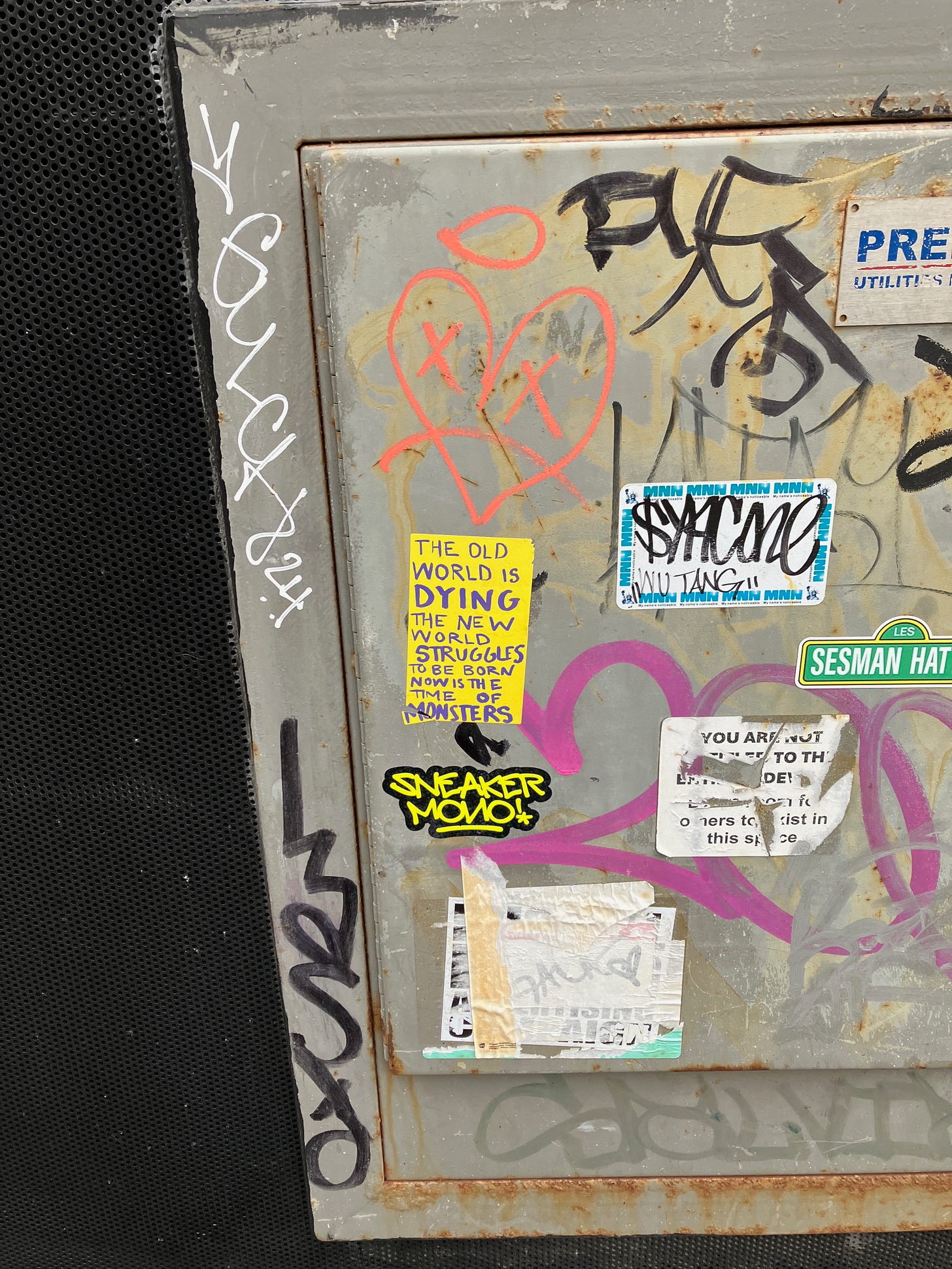
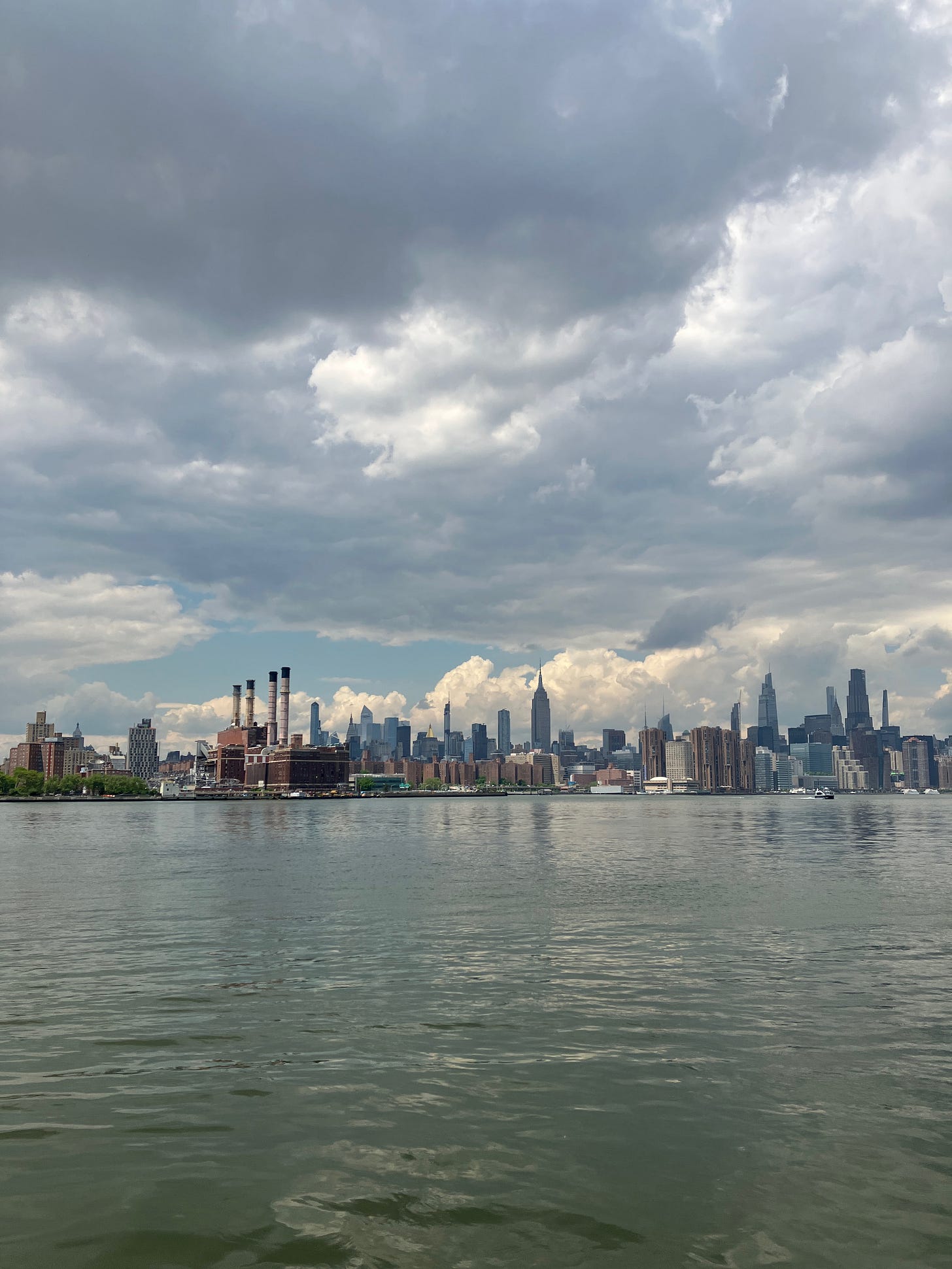
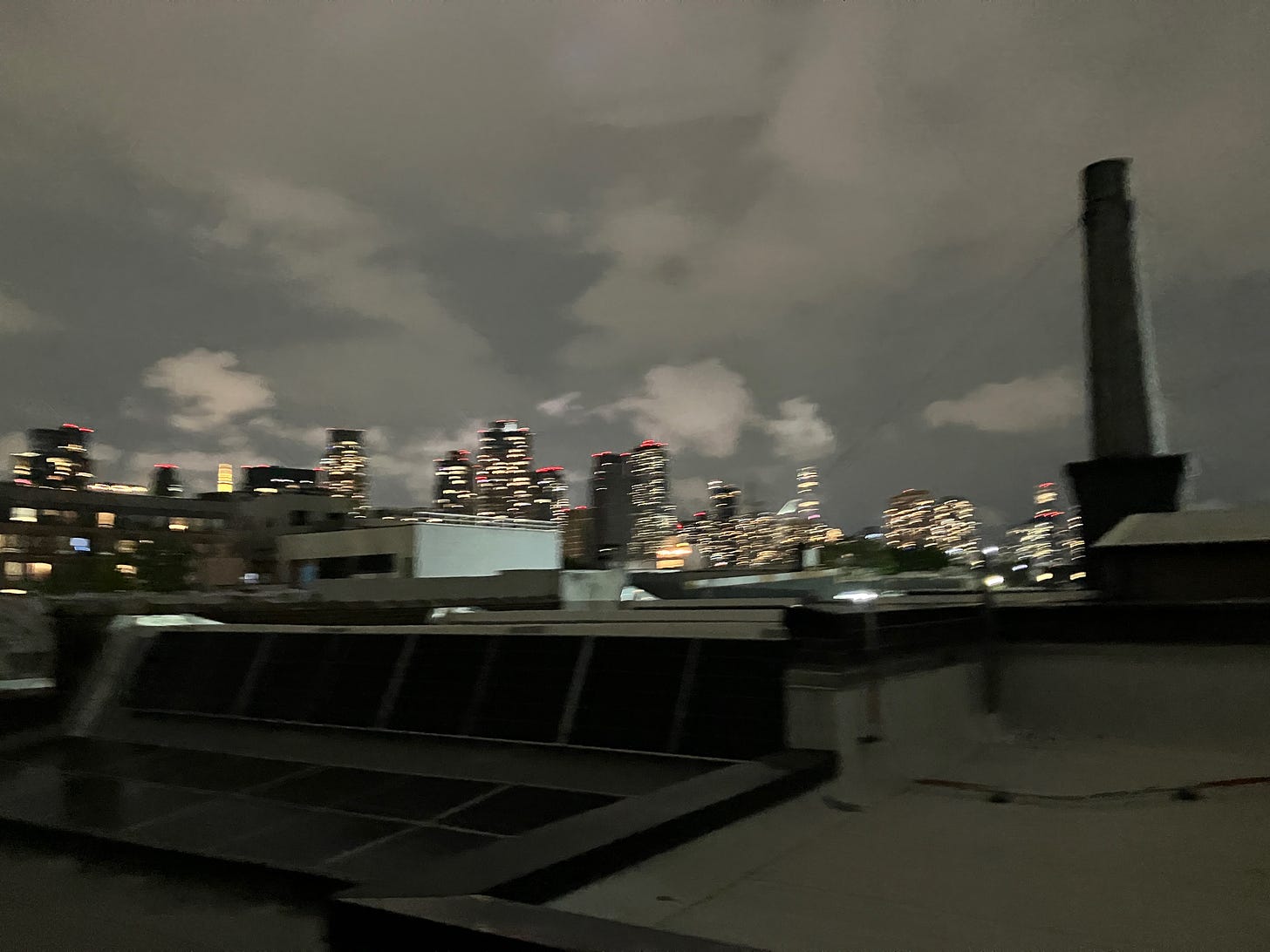
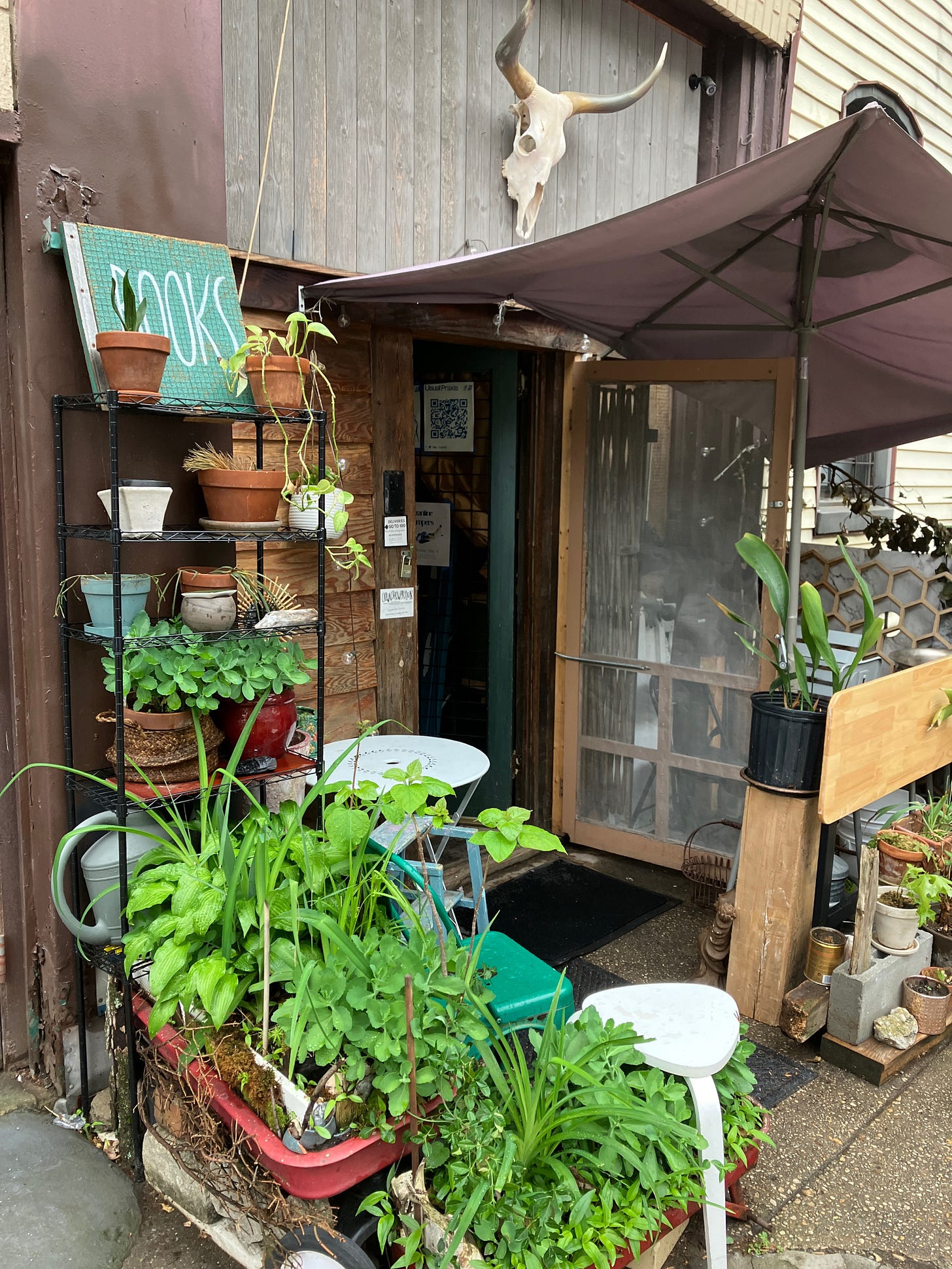
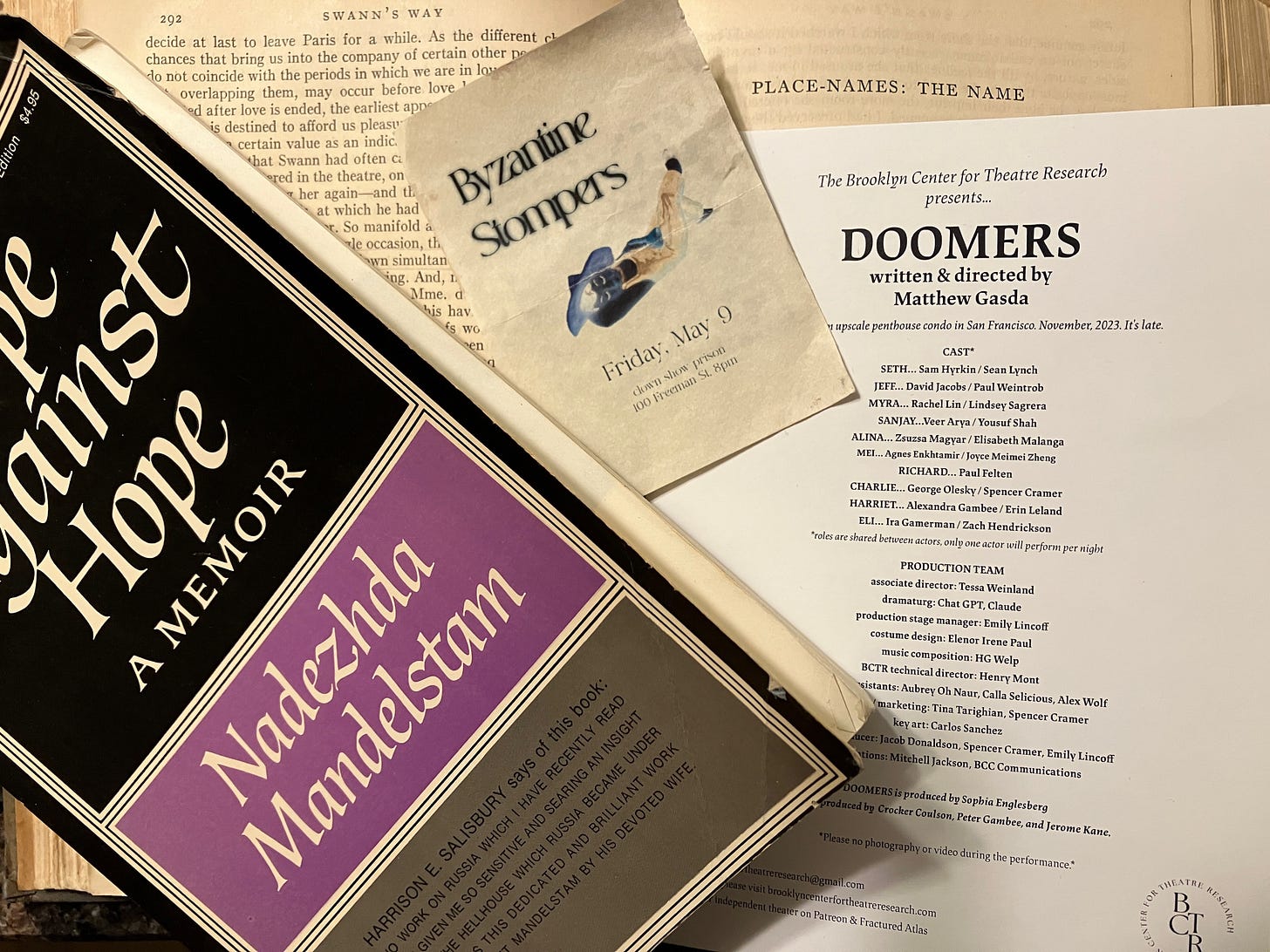
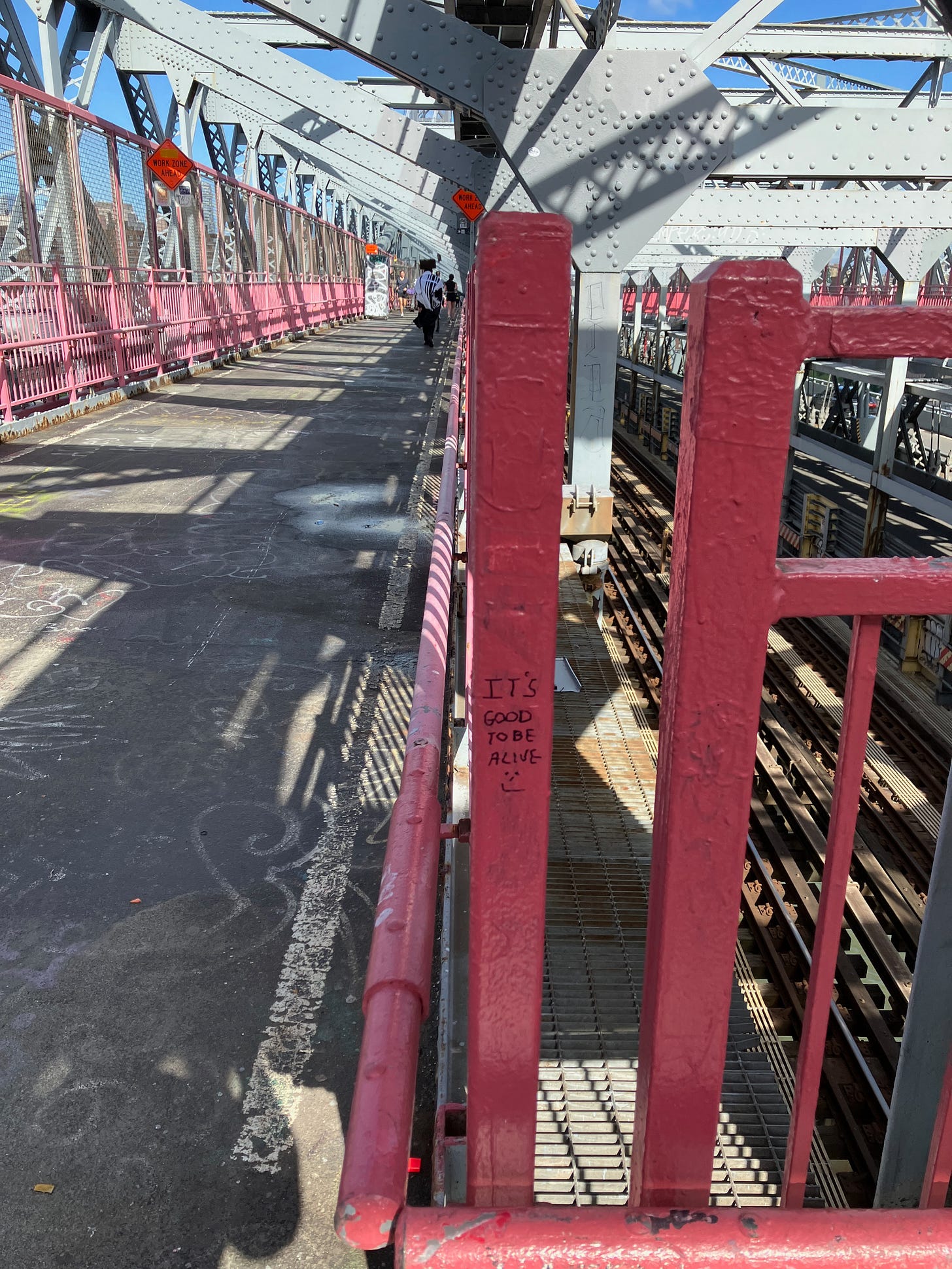

An unexpected pleasure to show up as a veiled presence in quality autofiction. Perhaps one day I'll be immortalized like a minor character at the Verdurin salon, in the style of Professor Cottard or Ski the sculptor. The pseudonymous academic Substacker who shows up at parties and is always turning the conversation to Hegel...
It was a memorable evening, the dumpster-diving Russian bookstore owners break the flow of your narrative because they sound made up. I'm regret that my commitment to waiting for the paper copy kept me from reading your novel before meeting you. I'm really enjoying it and promise to write something about it soon.
I wish I could write this well about my daily experiences. Good stuff, thanks for sharing!! :)